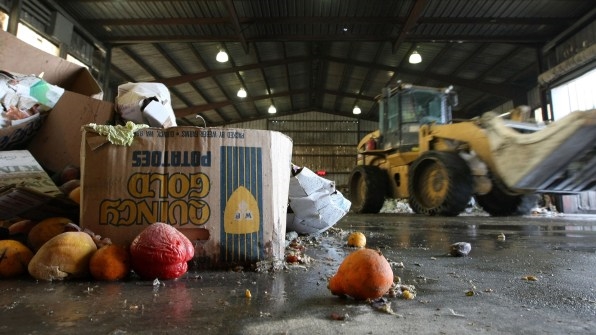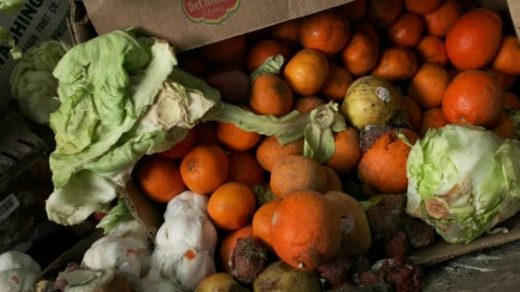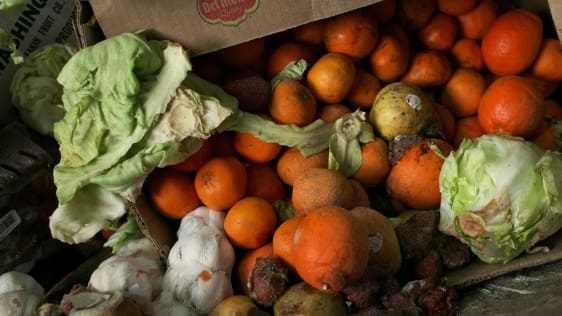New York’s Sanitation Bureau Is Searching For Food Waste Innovations
Every day, New York residents, institutions, and businesses produce around 24,000 tons of solid waste. Around 20% of that waste is food.
Perhaps no city bureau is more familiar with the issue of food waste than the N.Y.C. Department of Sanitation (DSNY), so it makes sense that the agency would be throwing its hat into the ring of efforts to mitigate it. On November 3, the Foundation for New York’s Strongest–DSNY’s nonprofit arm–announced a microgrant program to fund local businesses interested in developing initiatives to curb food waste. DSNY has already established a successful curbside organics collection program in the city, which diverts around 30 tons of food waste from landfill each day. Most of that waste comes from the residential sector, however, and the agency’s new microgrant program will help bring some of its benefits to small businesses.
Over the summer, the Foundation for New York’s Strongest hosted the inaugural N.Y.C. Food Waste Fair. Through ticket sales and sponsorship for that event, which comprised an array of vendor displays and panel discussions, the nonprofit raised around $100,000, $50,000 of which was earmarked for the incentive program for small local businesses, Elizabeth Balkan, policy director at the DSNY commissioner’s office, tells Fast Company.

The $50,000 will be allocated out in microgrants totaling no more than $2,000 for individual small business applicants, and $5,000 should a group of businesses in an neighborhood decide to work together on a proposal and apply collectively. For the time being, the foundation has not set a total of initiatives it hopes to fund through the program, recognizing that financial needs will vary greatly across proposals. “Examples of things we’d love to see include, but are not limited to: equipment for sorting, apps or other technologies for tracking waste, piloting food waste prevention in buffet areas (like signage, customer incentives/penalties and training), partnerships with community gardens or other businesses to develop a compost or food donation consortium,” Balkan says in an email.
The microgrants, Balkan says, may not seem like a huge amount of money, but the funding from DSNY will be just one aspect of what is offered to grantees through the program. The foundation is working with a number of organizations that will offer services and funding to supplement the initial grants. One is the New York State Pollution Prevention Institute, which runs through Rochester Institute of Technology and has state funding to help businesses manage waste–they’ll be bringing in experts to help businesses perform waste audits, do staff training, and build out a waste-mitigation framework, Balkan says. Kickstarter will match some of the grants, and various N.Y.C. Food Waste Fair exhibitors like Renew Packaging, which specialize in organics collection bins or compostable products will be donating items to the microgrant recipient. “It’s hard to pinpoint an exact amount, but we’re estimating that any business will be receiving funds and services totaling around $15,000,” Balkan says.
One of the principal issues with tackling food waste at the city level, Balkan says, is the lack of collaboration and communication across city agencies like DSNY, local businesses, and food waste experts and advisors. Apart from equipping businesses with some startup capital to curb food waste, the microgrant program also lays a clear outline of the key players–from the city to academic institutions to private companies–who can play a role in building out a comprehensive food waste strategy. While this microgrant initiative will be limited to New York City, Balkan says that representatives from the Los Angeles Sanitation Bureau, who were present at the N.Y.C. Food Waste Fair, are working on bringing a similar program to L.A., and DSNY has also fielded calls from London and other cities.
Because this is the program’s first iteration, the Foundation for New York’s Strongest doesn’t yet have a set-in-stone plan for how to scale the proposals going forward. Balkan hopes that this year’s grantees will act as mentors to the next round chosen, and that they will be able to source future rounds of grant money to perhaps scale their initiatives up the Business Improvement District level.
For small businesses in New York, applications for the grants are due on January 8, and there are two weeks between now and that date–one week in early December, and another right before the deadline–Balkan says, in which businesses can get in touch with the microgrant initiative advisory committee to ask questions. “The idea is not only to strengthen businesses’ capacity through funding and services, but to help them if they just have an interest and don’t know where to start,” Balkan says.
Fast Company , Read Full Story
(52)














